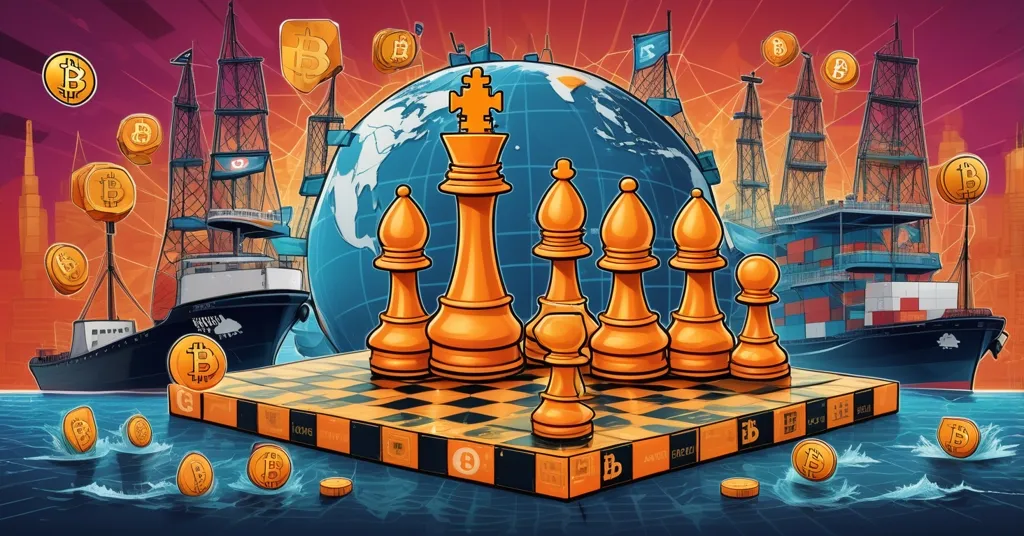Trump’s Indonesia Trade Deal: Could Tariffs Fuel Bitcoin and Blockchain Adoption?

Trump’s Indonesia Trade Deal: Economic Power Play or Hidden Boost for Bitcoin and Blockchain?
President Donald Trump has once again shaken up the global trade scene, announcing a new deal with Indonesia via Truth Social on July 15, 2025. Billed as a win for American interests, this agreement—struck under the shadow of steep tariffs—marks the fourth trade pact since Trump’s reciprocal tariff policy kicked in earlier this year. But beyond the headlines, could this high-stakes economic chess game open doors for Bitcoin and blockchain to redefine how nations trade and transact?
- Deal Snapshot: Trump announces a trade agreement with Indonesia, cutting tariffs from a threatened 32% to 19% on their exports, with no tariffs on US goods.
- Global Ripple: Similar pacts with Vietnam, China, and ongoing talks with Canada reveal a volatile trade landscape.
- Crypto Angle: Economic pressures and transparency gaps could accelerate Bitcoin adoption and blockchain solutions in trade.
Indonesia Deal Breakdown: The Numbers and the Silence
Trump’s announcement on Truth Social was vintage bravado, proclaiming,
“Great deal, for everybody, just made with Indonesia. I dealt directly with their highly respected President. DETAILS TO FOLLOW!!!”
The specifics, now partially revealed, peg Indonesian exports to the US at a 19% tariff—down from a looming 32% set to hit on August 1, 2025—while Indonesia must accept American goods tariff-free. On top of that, Indonesia has committed to buying $15 billion in US energy, $4.5 billion in agricultural products, and 50 Boeing jets, many of the 777 model. US Commerce Secretary Howard Lutnick framed this as a deliberate tilt, saying,
“No tariffs there; they pay tariffs here. Switching the asymmetry our way.”
Yet, there’s a glaring hitch: as of the latest updates, the Indonesian government hasn’t publicly confirmed the deal announced by President Trump. Is this a done handshake, or just Trump’s premature victory dance?
Indonesia, the 23rd largest US trading partner, sends $28 billion in goods annually—mostly apparel and footwear—while importing $10 billion in American products like oilseeds, grain, and gas. This stark imbalance likely drove the urgency of negotiations, led by Indonesia’s Coordinating Minister for Economic Affairs, Airlangga Hartarto, who met with US heavyweights including Trade Representative Jamieson Greer, Commerce Secretary Lutnick, and Treasury Secretary Scott Bessent. Trump also dangled a carrot for Indonesia’s high-quality copper exports, suggesting lower or no tariffs despite a planned 50% tax on all copper imports starting August 1. With Indonesia’s copper trade at a modest $20 million compared to giants like Chile ($6 billion) and Canada ($4 billion), this exemption hints at a strategic grab for critical resources. For a deeper look into the framework of such agreements, check out this explanation of US-Indonesia trade pacts.
Global Trade Under Fire: Tariffs Redraw the Map
This pact isn’t a standalone move. Since introducing reciprocal tariffs in April 2025, Trump has inked deals with the UK, China, and Vietnam, each under the threat of economic hardball. Take Vietnam: a recent agreement slaps a 20% tariff on their direct exports and a punishing 40% on transshipped goods—products rerouted through Vietnam to dodge other tariffs—while they must charge 0% on US imports. For clarity, transshipping is a common tactic where goods, say from China, are funneled through a third country to mask their origin and skirt higher tariffs. Vietnamese officials, expecting a gentler 10-15% rate, were blindsided by Trump’s terms, with Party Chief To Lam and Prime Minister Pham Minh Chinh now pushing to renegotiate while diversifying supply chains. US Secretary of State Marco Rubio noted,
“Vietnam wanted to have a levy rate that’s at least as good as, if not better than, other countries that don’t have a trade agreement with the United States.”
More on Vietnam’s trade challenges can be found in this analysis of the 40% transshipping tariff impact.
Meanwhile, China, locked in a tariff truce with the US until August 12, 2025, watches nervously as Vietnam’s transshipping penalties could disrupt their own tariff-dodging plays. Treasury Secretary Scott Bessent offered a glimmer of hope, stating,
“Their talks with China are in a very good place,”
hinting at a possible extension. Closer to home, Canada faces a reality check under the United States-Mexico-Canada Agreement (USMCA), which once secured 99% tariff-free trade. Prime Minister Mark Carney admitted tariffs are likely, saying there’s a
“lack of evidence that the US is offering tariff-free agreements.”
Ambassador Kirsten Hillman is scrambling to preserve favorable terms, but the tide seems to be turning toward compromise. Analysts warn that Trump’s tariff aggression could boomerang, pushing production costs up if companies relocate to the US, leaving American consumers footing the bill. For the latest on China’s tariff truce, see these updates from Scott Bessent.
Decentralized Solutions: Bitcoin and Blockchain in the Trade Game
Now, let’s zero in on why this matters to us at Let’s Talk, Bitcoin. These trade wars and tariff showdowns aren’t just economic news—they’re a glaring billboard for why decentralized tech like Bitcoin and blockchain could steal the spotlight. Picture this: blockchain’s tamper-proof ledgers and real-time tracking could slice through the mess of transshipping disputes plaguing Vietnam and China. No more guessing games about where a shipment originated—platforms like IBM’s TradeLens or VeChain are already proving that immutable records can ensure transparency in supply chains. If adopted in deals like the US-Indonesia pact, blockchain could prevent fraud and build trust, especially when one side (cough, Indonesia) stays mum on agreements. Learn more about blockchain’s role in resolving global trade disputes.
On the financial front, Bitcoin—the original, battle-tested crypto—stands as a potential fortress against fiat devaluation for countries under tariff pressure. Think about Indonesia, where the rupiah has historically wobbled during economic stress. Citizens and businesses, much like in Venezuela or Argentina during their currency crises, could turn to Bitcoin as a store of value or a cross-border payment tool free from government or bank interference. Southeast Asia, including Indonesia, is already a hotbed for crypto growth—Chainalysis reports rank it high in adoption rates. If Trump’s tariffs push trading partners into economic corners, we might see an unintended turbocharge of crypto use as a middle finger to centralized financial chokeholds. Could tariffs be the unlikely catalyst for mass Bitcoin adoption? For insights into this trend, explore Bitcoin’s growing adoption in Indonesia.
Risks and Counterpoints: Will Trade Wars Backfire on Crypto?
Let’s pump the brakes on the hype train. While the cracks in centralized trade systems seem ripe for decentralized fixes, there’s no guarantee this plays out as a crypto utopia. First, the silence from Indonesia raises a red flag. If this deal isn’t fully locked in, or if it’s more political theater than economic strategy, it erodes trust in global trade frameworks. Blockchain could help with transparent, verifiable agreements, sure—but it’s not a cure for diplomatic misfires or posturing. Plus, Trump’s unpredictable tariff hammer injects market volatility that might spook crypto investors as much as attract them. If consumer prices spike and economies stumble, risk-averse players could shy away from Bitcoin’s wild price swings. Curious about blockchain’s potential in trade transparency? Check out this discussion on blockchain improving transparency.
Playing devil’s advocate, what if these trade tensions don’t push nations toward Bitcoin, but instead into tighter fiat-based alliances? Some countries might double down on traditional systems or form anti-US trade blocs to counter tariff aggression, sidelining decentralized finance altogether. Regulatory pushback is another beast—governments under economic strain often clamp down on crypto to maintain control, not embrace it. And let’s not forget: while blockchain offers supply chain clarity, it’s not a magic wand for the raw pain of tariffs or the higher costs American consumers might face. This is a high-stakes gamble, and the house—centralized power—still holds plenty of cards. Community perspectives on this can be found in this Reddit thread on Trump’s trade deal and Bitcoin.
Key Questions on Trump’s Trade Deal and Crypto’s Future
- How does the US-Indonesia trade deal potentially spur Bitcoin adoption?
Tariff pressures could drive Indonesians to Bitcoin as a hedge against rupiah volatility, mirroring trends in other economically stressed nations like Venezuela. - Can blockchain technology tackle trade disputes like transshipping issues?
Yes, its transparent, immutable records could track goods across borders, curbing fraud and clarifying origins to prevent tariff evasion, as seen with platforms like VeChain. - What risks do Trump’s tariff policies pose to the crypto market?
While economic uncertainty might position Bitcoin as a safe haven, broader market instability could deter cautious investors, slowing mainstream crypto growth. - Could trade tensions steer countries away from decentralized finance?
Possibly—nations might cling to fiat systems or form traditional trade alliances to counter US policies, though financial strain could still spark crypto experimentation. - Why does Indonesia’s lack of confirmation matter for blockchain’s relevance?
Unconfirmed deals highlight trust gaps in global trade, emphasizing blockchain’s potential to ensure transparent, verifiable agreements and prevent premature announcements.
What’s Next for Crypto in Global Trade?
Trump’s tariff blitz—from Indonesia to Vietnam to Canada—is a geopolitical poker game with high stakes for economies worldwide. For the crypto crowd, it’s a stark reminder that every centralized power play cracks open a window for decentralization to shine, whether it’s Bitcoin as a financial lifeline or blockchain as a trade transparency tool. Yet, we’ve got to stay sharp. These deals are as much about political optics as economic substance, and the fallout could just as easily stifle innovation as ignite it. One thing’s clear: the world’s watching, wallets and nodes at the ready, to see if this trade turmoil deals a winning hand for Bitcoin or just another wild card. Keep your eyes peeled—global trade and crypto’s role in it are only heating up.



